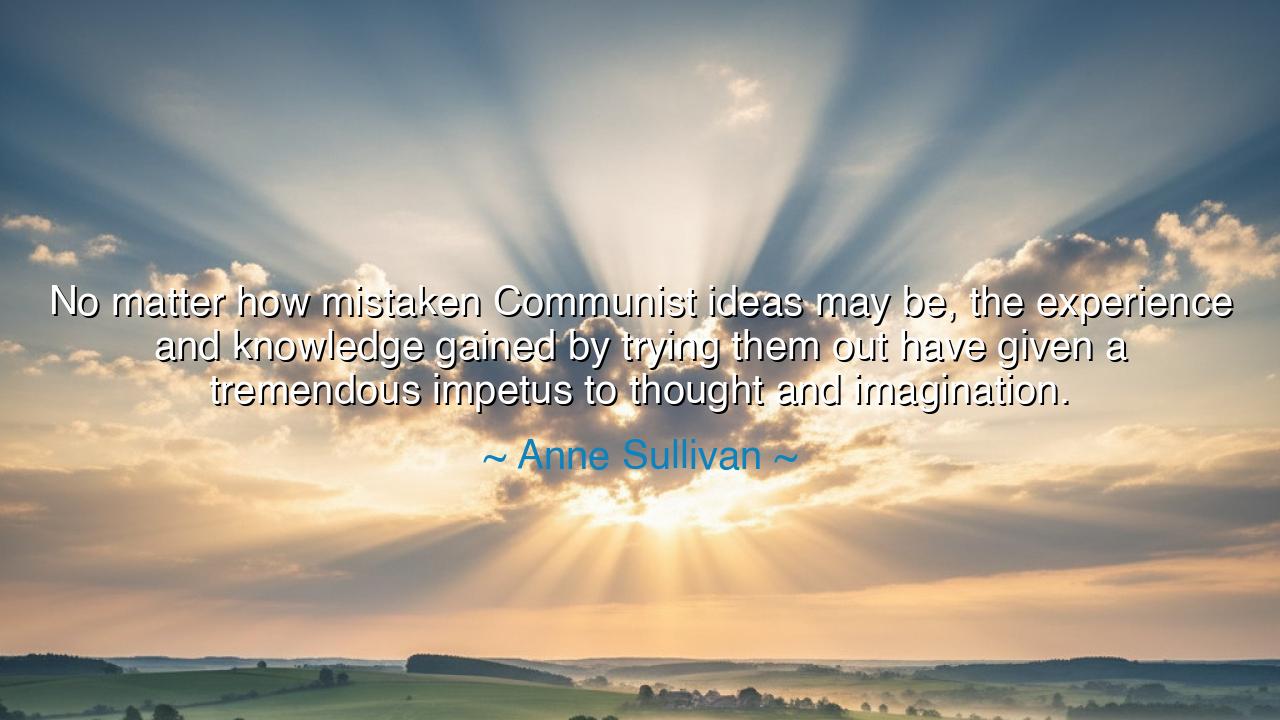
No matter how mistaken Communist ideas may be, the experience and
No matter how mistaken Communist ideas may be, the experience and knowledge gained by trying them out have given a tremendous impetus to thought and imagination.






"No matter how mistaken Communist ideas may be, the experience and knowledge gained by trying them out have given a tremendous impetus to thought and imagination." These words by Anne Sullivan reflect a profound understanding of the importance of experience in shaping human progress. Sullivan acknowledges that even ideas that may ultimately be flawed can still serve as a powerful catalyst for introspection, growth, and the expansion of imagination. In this statement, Sullivan calls us to recognize that the journey itself—the act of exploring and testing ideas—holds immense value, regardless of the final conclusions we reach. The mere act of engaging with ideas, whether they are correct or misguided, fosters thought, encourages dialogue, and ignites the flame of creativity and innovation.
In the ancient world, this principle was embodied in the practices of the Greek philosophers, who would engage in rigorous debate and challenge prevailing ideas, not to prove them wrong, but to expand the scope of thought. Socrates himself famously said, “The unexamined life is not worth living.” To question, to explore, and to test ideas was not seen as a waste, but as a vital part of the search for truth and wisdom. Even when Socrates faced trial for his beliefs, he held firm in his conviction that the pursuit of knowledge, through exploration of all ideas, was worth any sacrifice. In much the same way, Sullivan’s reflection reminds us that the process of testing ideas—whether through success or failure—brings clarity and drives human progress forward.
Consider the example of Aristotle, whose thinking laid the foundation for much of Western philosophy and science. Although many of his conclusions have since been revised or discarded, his method of empirical observation and logical reasoning remains one of the most important contributions to human thought. Aristotle did not fear mistakes; he valued the process of inquiry, the journey of learning through trial, error, and imagination. His scientific method was shaped by his willingness to engage with the world in all its complexity. The same can be said of Anne Sullivan's perspective: even the most misguided ideas, when engaged with thoughtfully, spark the imagination and open doors to deeper understanding.
In more recent times, the 20th century saw the rise of Communism, particularly in the works of Karl Marx and Friedrich Engels, as a revolutionary force that aimed to reshape society and dismantle class structures. Though history has shown the failures and abuses that arose from attempts to implement these ideas, it cannot be denied that the experimentation with Communist ideologies ignited powerful debates about equality, social justice, and economic systems. Even when these ideas failed to achieve their intended goals, they provoked a great deal of intellectual engagement. Movements, revolutions, and the work of thinkers across the globe were shaped by these experiments, and the imagination of society was irrevocably expanded.
Sullivan’s words also suggest that ideas must be tested in the real world to truly understand their value. Theories, no matter how well-intentioned or carefully crafted, remain abstract until they are put into practice. In ancient times, this was seen in the early Roman Republic, where the philosophers and statesmen alike often found that theoretical laws and ideas about governance could only be truly tested when put into the crucible of real-world experience. The creation of the Roman system of checks and balances, and its eventual transition to Empire, illustrates how systems are shaped by the realities of human nature and governance. Sullivan reminds us that only through real-world engagement can we begin to fully grasp the implications of any idea, no matter how grand or flawed.
From this, we derive a vital lesson: it is action—the willingness to test, experiment, and experience—that brings clarity and meaning to even the most uncertain ideas. It is through exploration that we uncover truths and spark creativity. This process of engagement, even with imperfect ideas, allows us to expand the boundaries of our own imagination. Whether in science, art, politics, or personal growth, it is essential to remember that the journey itself is often more transformative than the destination. The act of pursuing ideas with an open heart and mind, while acknowledging their potential flaws, teaches us to think more deeply, act more thoughtfully, and innovate more freely.
The practical lesson for us today is to embrace the process of exploration and experimentation, even when we are uncertain of the outcome. Imagination is not merely the realm of fantasy; it is the ground in which all great ideas are planted. Whether we are tackling personal dilemmas, engaging with societal issues, or striving for innovation, we must dare to test the waters of the unknown. As Socrates did with his questions, as Aristotle did with his observations, and as the Communist ideologies did in shaping political discourse, we too must allow thought to evolve through experience. Even the mistakes we make along the way are steps in the great process of learning, as long as we remain open and engaged.
In our lives, let us act with the bravery to experiment, to question, and to imagine without fear of failure. By embracing the challenge of testing ideas—whether they are personal goals or larger societal shifts—we begin the process of not only transforming our minds but also expanding the horizons of those around us. It is through this courageous pursuit of imagination, unbound by the fear of failure, that we will continue to grow and evolve as individuals, societies, and as a collective humanity.






AAdministratorAdministrator
Welcome, honored guests. Please leave a comment, we will respond soon